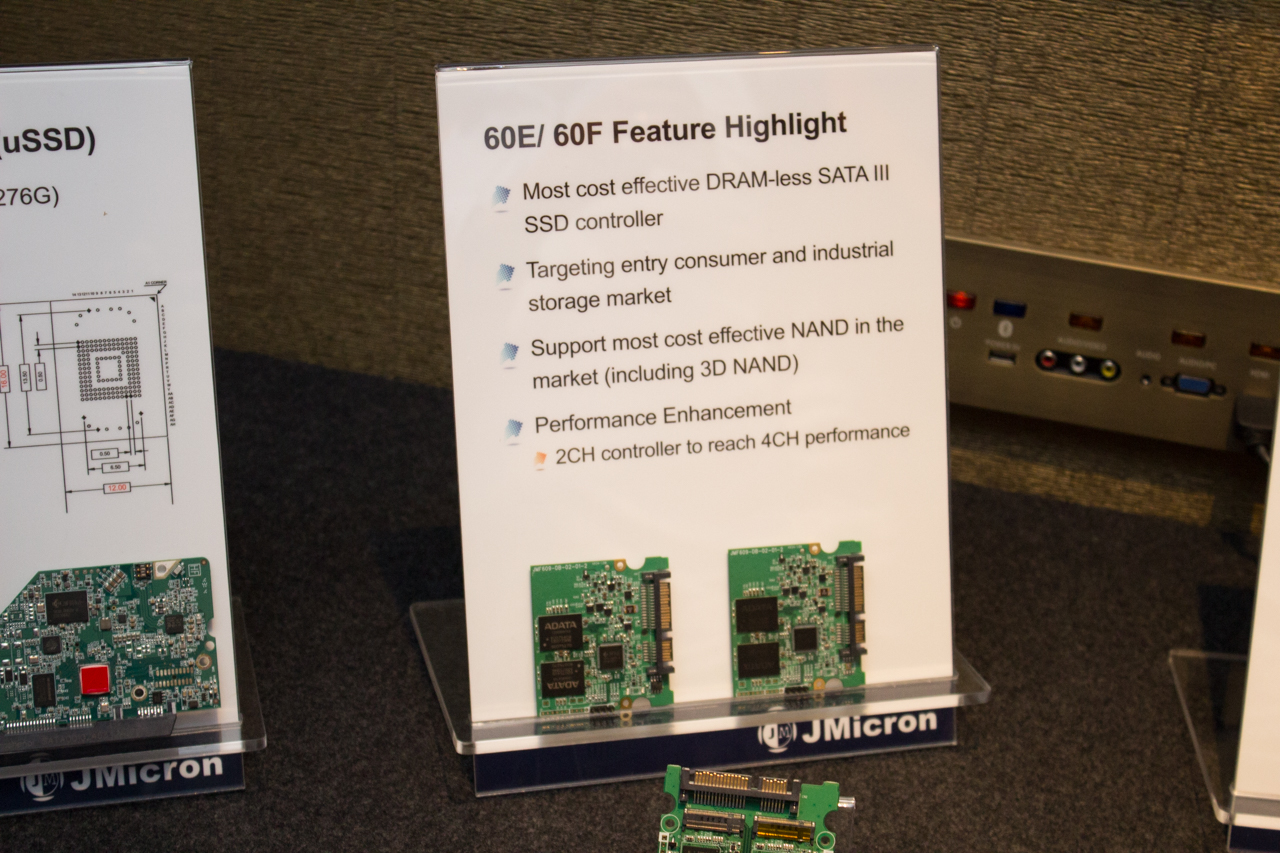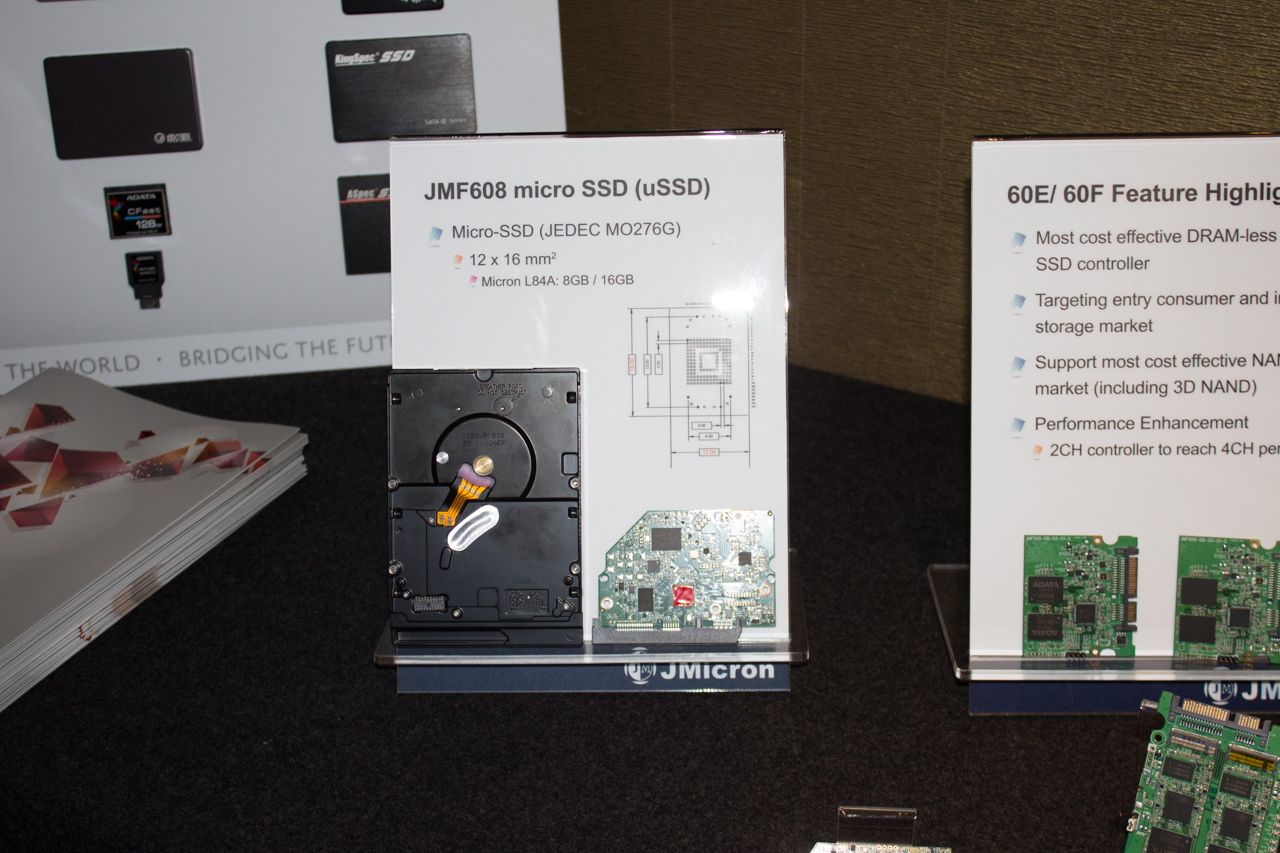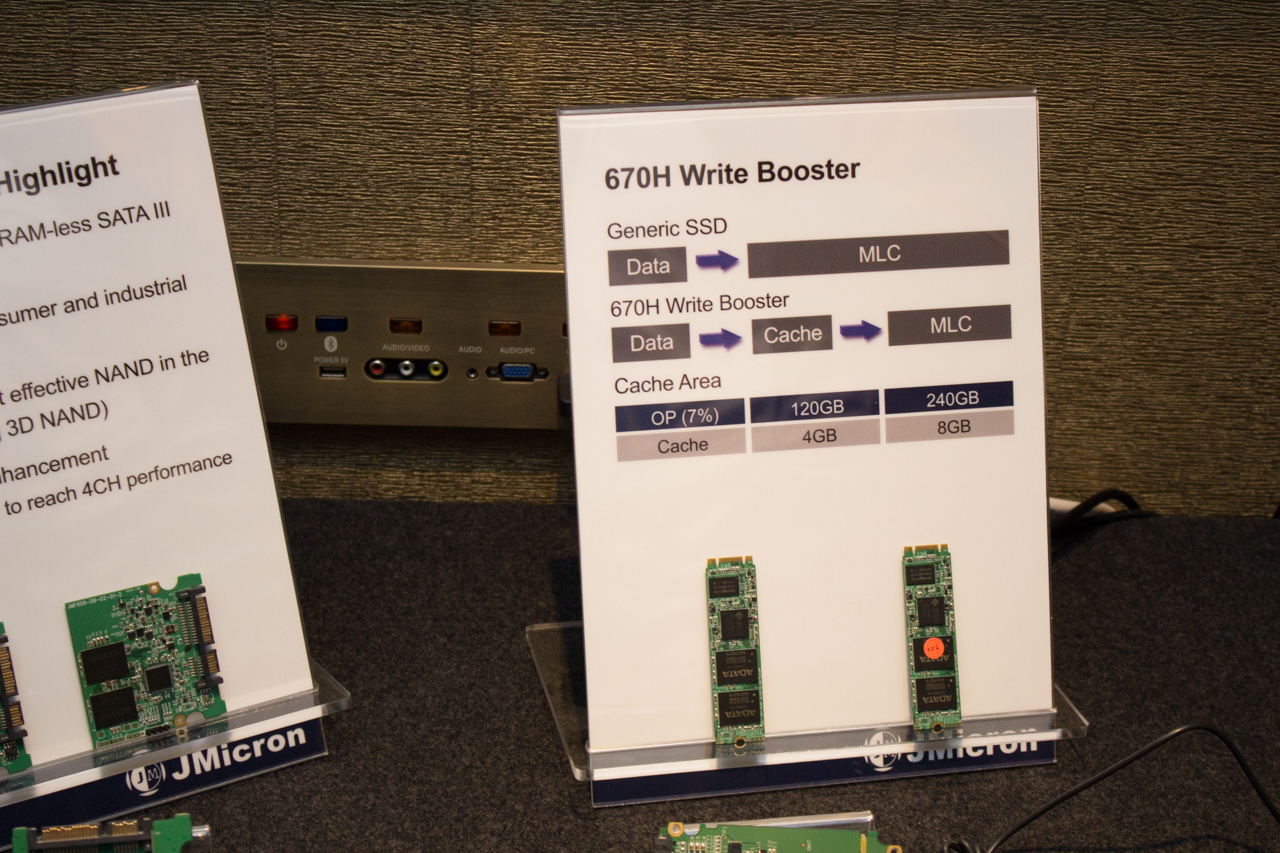The State Of Solid State: Computex 2015
JMicron
JMicron plans to go up against Marvell and Phison in the race to the bottom. During Computex, we published a lengthy article covering what that means and how companies plan to push low-cost SSDs into notebooks that currently ship with mechanical disks. In short, the goal is to bring 256GB SSDs down to the $50 price point, allowing solid-state storage to displace 250GB hard drives in $400 laptops.
Several things need to happen first. The starting point is a controller that supports TLC flash and maintains more than 100 MB/s performance without a DRAM buffer. JMicron has two candidates: the JMF60E and JMF60F. They'll mainly hit emerging markets and OEM notebooks.
In the past, Western Digital worked with JMicron on SSHD products. Last year, it previewed a 3.5" SSHD that has yet to come to market. JMicron didn't explicitly say its JMF608 controller was inside, but the company did show off an upcoming SSHD at Computex 2015.
Prior to this year's show, we wrote a lengthy preview of the new JMicron JMF670H controller that features Write Booster technology. JMicron had the JMF670H on display in its own suite and branded products in Adata's booth. The 670H is an entry-level controller designed to increase mainstream SSD performance while enabling the use of low-cost flash.
The JMF680 is a slightly faster mainstream model that scales up to 2TB with advanced ECC and a SATA interface. The 680 controller will work with both MLC and TLC flash.
JMicron also talked about JMF815, a two-lane PCIe 3.0 AHCI controller that delivers up to 1200 MB/s sequential read and 1000 MB/s sequential write speeds. We don't expect to see either the JMF680 or JMF815 processors in retail products until 2016.
Get Tom's Hardware's best news and in-depth reviews, straight to your inbox.

Chris Ramseyer was a senior contributing editor for Tom's Hardware. He tested and reviewed consumer storage.
-
blackmagnum The time is ripe to change your old spinning catastrophe and embrace the now of SSD.Reply -
Vivecss So have they fixed the data loss if not connected to electricity for more than a week thing?Reply -
synphul Spinning catastrophe? My hdd doesn't perform much slower than my ssd for 90% of tasks, the biggest improvement was installing windows. For that I was impressed. An hdd shouldn't be a catastrophe, if it is I'd strongly suggest a better brand/model. Installed an ssd on a workstation and of all the upgrades it was the component I was least happy with. The new cpu and ram upgrade were by far more impressive. Not that I'm 'unhappy' with it, it is a little snappier though not enough to make me rush right out to buy another one for my other rig. If another 240gb ssd goes on sale for $60 like the first one I bought I might consider it. Pcie m.2 look appealing and great on paper but I suppose it would be of greater benefit to someone who is suffering a bottlenecked system due to storage in the first place.Reply -
CaedenV ReplySo have they fixed the data loss if not connected to electricity for more than a week thing?
Yes, about 5 years ago.
SSDs are still no archival media, and they will corrupt after a year or two without power. But if you are the sort of person who travels a lot and unplugs your PC for 2-3 months at a time then it is not a real concern anymore. -
wtfxxxgp ReplySo have they fixed the data loss if not connected to electricity for more than a week thing?
I'm so out of touch that I didn't even know that was "a thing"
O.o -
Vivecss ReplySo have they fixed the data loss if not connected to electricity for more than a week thing?
Yes, about 5 years ago.
SSDs are still no archival media, and they will corrupt after a year or two without power. But if you are the sort of person who travels a lot and unplugs your PC for 2-3 months at a time then it is not a real concern anymore.
Really? 5 years ago? Because I've gone on vacation for about a month and my Windows wont even start anymore. And that was about a year ago. Heard a rumor that the 3D stacking technology thing managed to eliminate this problem and i was waiting for some more good news about that before buying a new SSD.
-
CRamseyer ReplySpinning catastrophe? My hdd doesn't perform much slower than my ssd for 90% of tasks, the biggest improvement was installing windows. For that I was impressed. An hdd shouldn't be a catastrophe, if it is I'd strongly suggest a better brand/model. Installed an ssd on a workstation and of all the upgrades it was the component I was least happy with. The new cpu and ram upgrade were by far more impressive. Not that I'm 'unhappy' with it, it is a little snappier though not enough to make me rush right out to buy another one for my other rig. If another 240gb ssd goes on sale for $60 like the first one I bought I might consider it. Pcie m.2 look appealing and great on paper but I suppose it would be of greater benefit to someone who is suffering a bottlenecked system due to storage in the first place.
A $60 240GB SSD is the reason why you don't feel a big performance increase over your HDD.
-
WyomingKnott "Really? 5 years ago? Because I've gone on vacation for about a month and my Windows wont even start anymore. And that was about a year ago."Reply
But how old was the SSD? The model, not the particular one that you own. -
synphul It was on sale. At the time, ocz vector 150's were going for $180. It stays neck and neck with the samsung 840 evo (850's weren't even available yet) and the two trade blows a bit. The vector 150 has slightly slower random reads and the samsung has slightly slower write speeds. It was chosen for a workstation doing content creation with larger files where write speed was preferred. Maybe people feel such a huge difference over their hdd's because they're using junk hdd's? My wd re4 gives me no issues. The only time aside from bootup that ssd's seem to have a huge performance gain is during testing where a longer sustained data transfer is occurring. Something most people won't encounter under normal use of a pc, instead it will more than likely operate in small bursts. So technically, it was a $180 ssd using the newer 19nm toshiba nand. Hardly a junk ssd.Reply -
CRamseyer When you said it I was thinking something along the lines of a V300 with async flash.Reply


